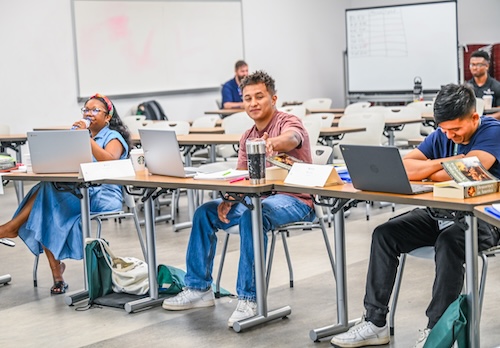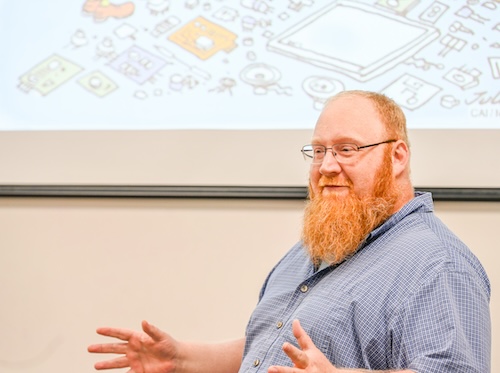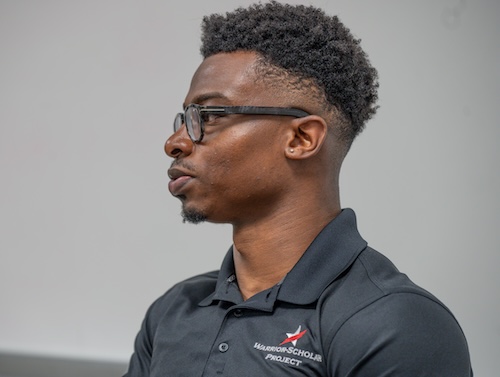It can be daunting for a veteran to decide what’s next after a tenure of military service. Over 100,000 veterans transition from the military to higher education every year; however, only 1% of the total undergraduate populations of top 20 higher education institutions are veteran students. Many veterans struggle to transition back to civilian life and can feel unprepared for their next steps.
Michigan State University hopes to change that through a partnership with Warrior-Scholar Project, or WSP, an organization that, among many programs, helps college campuses host an academic boot camp for U.S. veterans. MSU’s boot camp, which is one of 20 similar boot camps across the nation, ran from July 13 to 20.
“At Michigan State, we’re dedicated to closing the opportunity gap for our student veterans, and Warrior-Scholar Project does just that. This partnership provides MSU with an unprecedented opportunity to effect positive change for participants, showing them that they not only belong here but that they can also thrive here,” said Patrick Forystek, director of MSU’s Student Veterans Resource Center.
The academic boot camps work to prepare veterans for life in higher education and include writing workshops, skill-building assignments, problem-solving challenges and MSU professor-led classes

The WSP impact is far-reaching. According to national statistics from WSP: 88% of WSP alumni have completed or are on track to earn a college degree, compared to 72% of all student veterans and 65% of traditional undergraduate students. WSP participants are also diverse; of WSP’s 2023 cohort, 58% identified as first-generation college students, 65% were individuals of color and 20% were women.
“I grew up in Michigan and never thought that I could attend a top-tier university — I thought it was a dream. I saw Michigan State University on the list and jumped on it,” said Joseph Corless.
Corless is an active Army Ranger and logistician who participated in MSU’s boot camp. He said that the experience was challenging and helped him build self-confidence.
“To be presented with a task or a problem and be able to work through how to solve it has been exciting. I do that at work all the time but didn’t know that it could translate to the university level.”
Kevin Rocha, who served in the Marine Corps as a mechanic, said one of the highlights of the experience was working with faculty. “All the professors are so enthusiastic and full of life, which translates to us as students and motivates you to learn. They draw out the best in you and parts of you that you didn’t know that you had,” Rocha said. “You start to discover yourself and think, ‘Wow, do I have a passion for this?’”
Three MSU faculty participated in the week-long classes, leading sessions that included “The Declaration in Context” led by James Madison College’s Associate Professor Benjamin Lorch; “The Constitutional Framework” by Associate Professor Ian Ostrander in the Department of Political Science; and “Public Service in Contemporary America” by Assistant Professor Jordan Cash, also from James Madison College.

Boot camps are led by fellows, former WSP attendees who are currently in college. The fellows provide tips and strategies that can support veterans in achieving success in higher education like how to effectively manage time and take better class notes. The fellows also provide mentorship to attendees as they navigate their new environment.
“Coming back, it’s been interesting to see the process from this point of view,” said Tojyea Matally, a WSP fellow and a sophomore at Syracuse University. “You see the transformation of the students as you facilitate these experiences and plant the seeds throughout the week through mentorship.”
This is the first year that MSU has hosted an academic boot camp through WSP. During the weeklong program, participants stay on campus in the residence halls and eat in the dining halls. Each boot camp focuses on one primary area, typically either humanities, business or STEM — science, technology, engineering and math. The courses are open to enlisted veterans either without a bachelor’s degree or currently enrolled in a bachelor’s degree program as well as enlisted active duty and reservist service members without a bachelor’s degree.
This year’s boot camp at MSU focused on the humanities, giving participants opportunities to explore and practice college-level reading, essay writing and class discourse and dialogue. Through donor support and partnerships with universities, WSP academic boot camps are available to participants at no charge, including all programmatic and lodging expenses.
Learn more about the Warrior-Scholar Project and how to apply.
